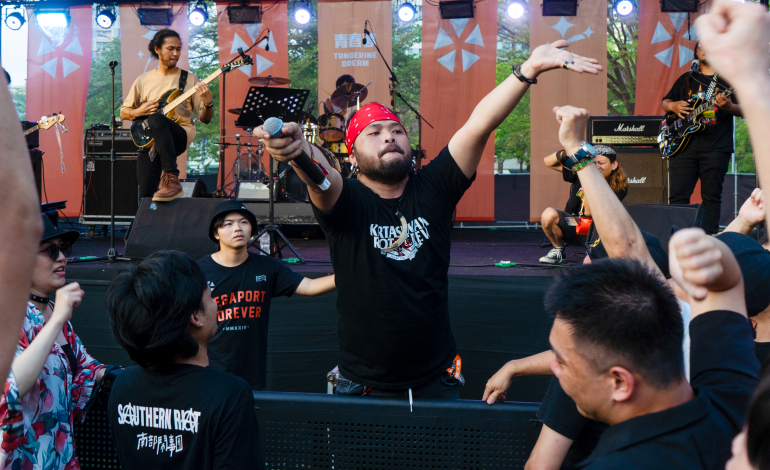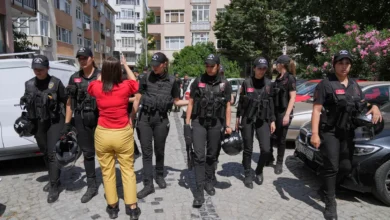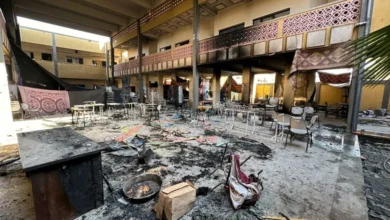Indonesian band takes stand for Taiwan’s migrant workers

Surrounded by his fellow band members, Rudi takes the stage in Taiwan’s southern port city of Kaohsiung. As he looks out over the crowd, his bandmates begin to play, whipping the audience into a frenzy of excitement.
“Silenced by threats, here we stand against this system of slavery,” Rudi sings, as the crowd forms a mosh pit, chanting along with him. Beside him, a banner strung between two microphones reads, “Migrant workers have the right to a voice”.
Mixing poetry and punk music, their protest songs rail against what they describe as the “systems of slavery” that they say trap migrants.
They provide a space for their audience, too – who are also mostly migrant workers – to express themselves and escape from working life. “On the stage, I feel happy,” Rudi explained. “Our songs are like an expression of our feelings.”
Facing exploitation
Almost all workers arrive in Taiwan through an employment agency or broker, which immediately opens them up to exploitation.
“We have to pay them to get us here,” Rudi said, referring to the “placement fees” these brokers charge. “Then, when we get to Taiwan, we also need to pay. They cut our salary to pay for the monthly fees.”
For many, these placement fees can be as much as $9,000. That represents an almost insurmountable cost for the migrant workers who exclusively come from less wealthy Southeast Asian countries, explained Lennon Wang from Serve the People Association (SPA), a local NGO that focuses on migrant worker rights.
Originally from a family of rural farmers in the north of the Philippines’s Luzon Island, Ronalyn Asis had to pay some 120,000 Philippine pesos ($2,035) to cover the costs of her training, plane tickets and placement fees before she started working as a domestic carer in Taiwan in 2014.
While Asis was able to borrow money from her extended family, Lennon said many others are forced to seek private loans. These are usually provided via the employment broker themselves and may come with high interest rates that can leave workers trapped in debt.
Their problems do not end when they arrive in Taiwan. Rudi explains that migrant workers are given more strenuous tasks and expected to work harder than their local counterparts, while others are not paid properly. “Every aspect of our work is full of injustice,” he added.
Many are expected to work beyond the remits of their contract, or without proper time off, Lennon said.
Initially employed to look after an elderly member of a Taiwanese family, Asis found that she was expected to also act as a household maid, cooking and cleaning for her employers. She was given just 10 hours of free time a month.
“At first, I felt very disappointed about the situation but I felt like I was tied to my employer already and that I didn’t have any choice but to accept,” she said. “I had loans to pay, so I sucked it up.”
Others are tricked into moving to Taiwan on entirely false pretences. When Asher and Jaali were first approached by an employment agent in Kenya, they were promised the opportunity to work as acrobats in a circus.
“The main reason I came to Taiwan was to perform, earn money, make myself and uplift my family,” explained Asher. “But when I came here, things changed.”
Rather than performing, both Asher and Jaali were told to work on a farm, operating heavy machinery and spraying chemicals. Their passports were taken by their employers so they were unable to leave and search for alternative work.
They are currently involved in ongoing legal cases and asked to be known only by pseudonyms so their families would not find out what was happening.
Asher and Jaali are not alone. “Most migrant workers in Taiwan have the risk of forced labour and human trafficking,” Lennon said. In 2023, Walk Free, an NGO dedicated to the eradication of slavery, estimated some 40,000 people were living in modern slavery in Taiwan.
For domestic carers, who often live in their employer’s house and therefore rely on them for income and a roof over their heads, the imbalance is even more pronounced.
When Asis told her employers that she was pregnant, they gave her 24 hours’ notice, leaving her without a source of income and facing homelessness. At seven months pregnant she was forced to move into a shelter run by SPA. She now lives among a group of migrant workers, many of whom have escaped exploitation or abuse.
Physical and sexual abuse is also common, especially for the mostly female domestic carers who may even be forced to share a room with their employers. “There are hundreds of workers who have been raped during the past years,” he said.
In research SPA commissioned in 2023, it found that one in six female migrant workers had faced gender-based violence including explicit or implied sexual demands.
Finding community
While migrants face difficult working conditions in Taiwan, many have a conflicted relationship with their adopted homeland.
For Asis, living in Taiwan has given her access to work and social services she would not have had at home. When her newborn baby boy fell ill, she said his treatment was cheaper than it would have been in the Philippines.










